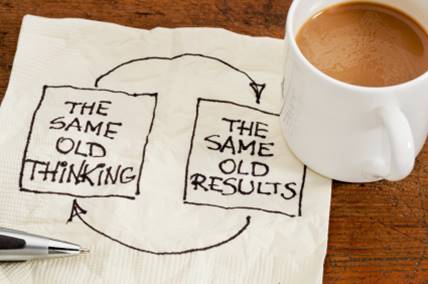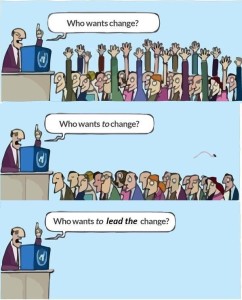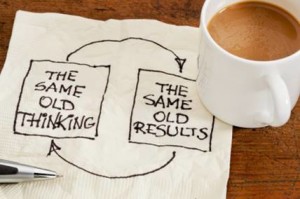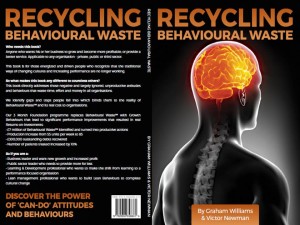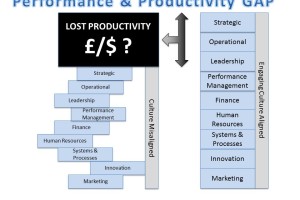Have you noticed how the one or two line sayings from real thought leaders are always simple and yet have far deeper meanings once you start to think about them.
So when Einstein said,
“The world as we have created it is a process of our thinking. It cannot be changed without changing our thinking.”
what are we thinking when we read it? Or do we just nod in a knowing sort of way and really don’t think at all?
Maybe we need another stimulus? Perhaps one that’s engaging our like for humour and one that engages our comical brain like this?
“Insanity : doing the same thing over and over again expecting different results.” Maybe a picture helps…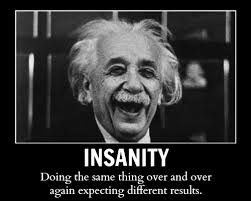
Or make it even simpler… To get better results, don’t you need to change something?
To some it will sound obvious, and you might say common sense that to improve on what you’re doing you need to change something. But how often are we brave enough to really change?
The next picture seems to be one that is more likely when we look at the business world.
But it’s not really funny is it?
When Boards, Directors and Management are under pressure to perform, improve the ROI, grow the business, maintain market share or just survive the global economic mess is it any surprise change is something that is resisted?
How about asking the question…
Do you think Einstein was wrong?
Whether Einstein said the “Insanity” quote or not I’ve always smiled when I’ve quoted it because if you do the same thing in the same way all the time, then prior to the global recession you would have expect to get the same results. But what about now? That’s not the case today for so many businesses, is it?
You may ask where’s the evidence for that? Take a short look at the high street changes in the UK – Jessops, BHS. What about the Steel Industry decline? No matter where we look there’s lots of evidence and your sector has its own issues I’m sure.
So to improve you have to do something different seems obvious, doesn’t it? If you say yes…what’s next?
Enter the first hurdle that many fear – what do we change? The questions then come thick and fast. It could be worse if we change the wrong thing? What would the shareholders say if we make it worse…? And all sorts of doom and gloom questions start to unfold.
But to improve, change you must!
Where to start? That’s the $1 million question.
Why not start simply?
The first question is where are we now? What do we do that gets these results? And the simple answer to that is probably we don’t really know. But what we do know is that we do some things good and some not so good.
So it should be a simple task to find out what we’re doing well and just do more of it. Wouldn’t we be doing that already?
Undoubtedly somewhere in the discussion will be about the resources. That should quickly result in a discussion about the quality of the leadership, the employees who deliver the results. That may then lead to skills and training and that’s the time we forget about Einstein.
But if you thought Einstein was right you’d look at things differently this time – wouldn’t you? Why differently this time?
Because all the evidence says
don’t do what the vast majority of change programmes do and give leaders and employees more knowledge training. You will just create a bigger “Knowing-Doing Gap”… and fail.
Adding to the Knowing-Doing Gap will be what we call Behavioural Waste ( Behavioral Waste )
Evidence of that is where?
As recent as 2013, Pfeffer & Sutton, reiterated the known enigma and continued existence of the “Knowing-Doing training gap”.
In 2014 published results in the Harvard Business Review from Sutton, R. I., & Rao, H. (2014). “Scaling up excellence: Getting to more without settling for less.” concluded
“It is necessary to remove destructive and negative attitudes and behaviours first...”
The choice then is yours
Do this… no change
Or listen to the evidence and dare to believe there’s something better.
If you dare to believe there could be something better, then you could look at this
On the following link
http://www.mindfitltd.com/product/recycling-behavioural-waste/
As ever you have a choice. What’s yours?
